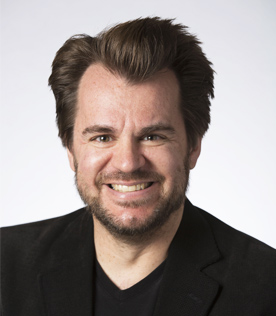Douglas Ficek, Ph.D.

Department of Human Sciences - Philosophy
College of Arts and Sciences
Education
Ph.D. in Philosophy, Temple University
M.A. in African-American Studies, Columbia University
B.A. in Philosophy, Iowa State University
About Douglas
New York City has been my home for over twelve years, but I am originally from Fargo, North Dakota and a proud graduate of Fargo North High School, a public institution of the highest order. I fell in love with philosophy way back then — largely because of Umberto Eco's mystery novel The Name of the Rose — and in my senior year I successfully lobbied my principal for a philosophy course, which, to my knowledge, was a first for the school.
Having decided to study philosophy and genetics, I began my undergraduate work at Iowa State University in Ames, Iowa. Shortly thereafter, I came to realize that philosophy was my true passion — not science, although I still loved to read about it — and that I should focus on "the love of wisdom" exclusively. But what would my specific focus be?
While the other philosophy majors were exploring the ontological status of numbers and the various arguments for the existence of God, my interests were far more existential, far more concrete. I wanted to explore issues concerning oppression and liberation, injustice and the ongoing fight for human freedom and dignity. Somewhat adrift, I began working with J. Herman Blake, who, at the time, directed the small African-American Studies Program at ISU. This would be a major turning point for me.
I soon realized that there is — and has long been — a profound intersection between philosophy and black studies, an intersection populated by some truly remarkable thinkers. And the more I read — from Alain Locke to Cornel West, from Anna Julia Cooper to Angela Y. Davis — the more I wanted to pursue Africana philosophy as a graduate student.
That desire ultimately brought me to New York City and to the Institute for Research in African-American Studies at Columbia University, where I did my M.A. under the careful guidance of Manning Marable and Jim Murray, both of whom, I am sorry to say, have passed on. In addition to doing research for the Malcolm X and Africana Criminal Justice Projects, I completed a thesis titled "C.L.R. James and Religion."
After graduation, I began teaching as an adjunct faculty all over New York City — from Touro College to Boricua College, from LaGuardia Community College to the College of New Rochelle. I also began my doctoral work in philosophy at Temple University in Philadelphia, PA. Needless to say, this required an absurd amount of commuting.
Why Temple University? Quite simply, because I wanted to work with Lewis R. Gordon, a philosopher whose work I had admired since randomly finding a copy of Existentia Africana in the summer of 2000 — yet another major turning point for me. Under his supervision, I completed and successfully defended a dissertation titled "Man Is a Yes: Fanon, Liberation, and the Playful Politics of Philosophical Archaeology."
Having taught at John Jay College of Criminal Justice for roughly ten years, I am now Visiting Assistant Professor at the University of New Haven, which is located in West Haven, Connecticut. Once again, I find myself doing lots of commuting. I am married to Rosario Torres-Guevara, Assistant Professor of Developmental Skills at Borough of Manhattan Community College, and we have an awesome cat named Compadre.
To find out more about Professor Ficek, visit his website at http://www.douglasficek.com/
Publications
"Review of Civil Disobedience and the Politics of Identity: When We Should Not Get Along by Jason D. Hill," in Notre Dame Philosophical Reviews (February 2014)
"Reflections on Fanon and Petrification," in Living Fanon: Global Perspectives, ed. Nigel C. Gibson (New York: Palgrave Macmillan, 2011)
"On Familial and Socio-Political Possibilities," review essay on Family Matters: Feminist Concepts in African Philosophy of Culture by Nkiru Uwechia Nzegwu, in Philosophy & Social Criticism, Volume 37, Number 8 (October 2011)
"Candide’s Legacy," in The Onion and Philosophy, ed. Sharon M. Kaye (Chicago: Open Court, 2011)
"Distinction without Difference," review essay on The Invention of Women: Making an African Sense of Western Gender Discourses by Oyèrónké Oyewùmí, in Philosophy & Social Criticism, Volume 32, Number 4 (June 2006)
"Rawls, Race, and Reparations," in Radical Philosophy Review, Volume 5, Numbers 1 and 2 (Fall 2003)
"Humanism: African-American Liberation (A)theology," in Free Inquiry, Volume 21, Number 4 (Fall 2001)
"College Students Talk Politics: Revisited," in Kettering Exchange (Fall 2000)